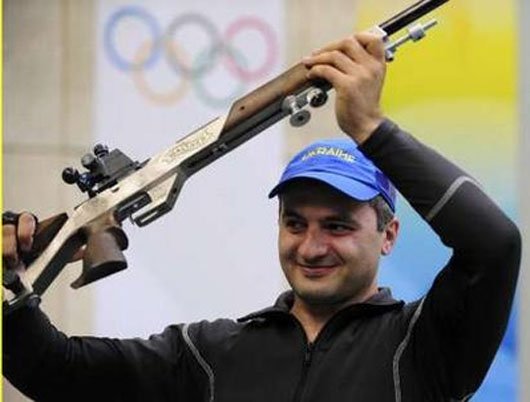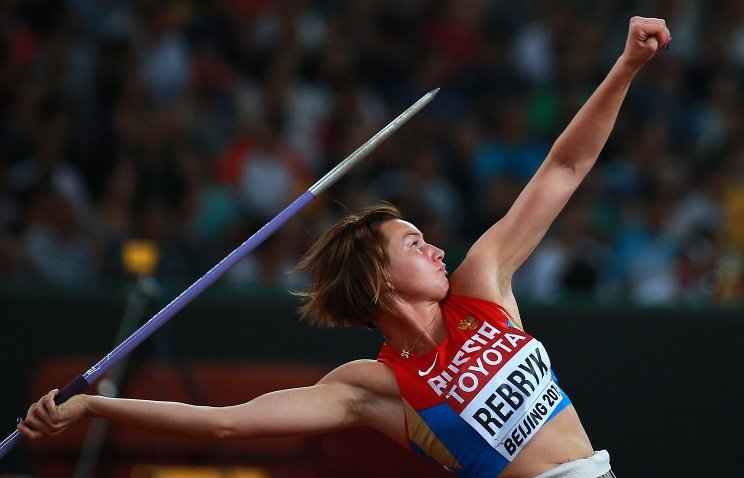Start reading here
Those who chose Russia
Crimean athletes who chose the Russian passport along with the Russian sports took this step for various reasons – hoping to have a more successful career, not wanting to leave a coach or Crimea. Nevertheless, the most of them do not hide their mercantile considerations: athletes’ incomes are much higher in Russia. However, the situation doesn’t develop so smoothly for those who have changed the passport and team-mates.
The Olympic champion in shooting Artur Ayvazyan was one of the first athletes who decided to choose the Russian tricolor. In the summer of 2014, he said in an interview with the Russian media that it wasn’t difficult for him to make a choice, because “the conditions for shooting are much higher” in Russia. In addition, Ayvazyan felt offended by Ukraine because he didn’t get an apartment after winning the Beijing Olympics.

Artur Ayvazyan
The Crimean javelin thrower, European champion of 2012 Vera Rebrik also chose Russia and joined the Russian team together with another six Crimean athletes with no hassles. This was possible due to the amicable agreement between Athletics Federations of two countries, according to which Ukraine has allowed its athletes to join another team and Russia paid compensation of $170 thousands (the Russians paid 150 thousand only for Vera Rebrik).

Vera Rebrik
The finalist of the Olympic Games, core thrower Aleksey Sokirsky explained his moving under the Russian flag by two reasons: the housing and, in his opinion, a higher level of sports in the Russian Federation.
“The accommodation issue was discussed with Ukraine, but I didn’t get any concrete proposals. In addition, the sport in Russia is at a higher level than in Ukraine. It affects both the funding and the availability of quality sports facilities. My results allow me to freely compete on the Russian arena, so I’ve made this choice,” Sokirsky said.
Rebrik and Sokirsky were, perhaps, the most successful Crimeans in Russia – they both have won several championships in Russia.
In 2014, the two-time winner of the world weightlifting championships Artem Ivanov also decided to perform as a Russian athlete. However, in 2015, he announced the end of his career referring to the injury received a few years ago. “I’ve changed my life significantly – I finished my career. Finished forever. I really wanted to return to elite sport… But, unfortunately, aggravation of the old injury did not allow me to participate in any tournament,” Ivanov said.
The behavior of Ukrainian sailing sportsmen – the married couple Maksim Oberemenko and Olga Maslivets, who frequently participated in the Olympic Games, caused the greatest indignation among Ukrainian athletes and fans, because they joined the Russian team even without informing Ukraine.

Olga Maslivets
“Maslivets and Oberemenko didn’t inform us about the possible transfer. They said nothing to anyone and made everything secretly. We would never let them perform in the country-aggressor. They knew that. . I am shocked by the behavior of this married couple,” the head coach of the Ukrainian sailing team Sergey Pichugin was indignant with the actions of his team members and added that the Crimeans visited the competitions by using Ukrainian travel passports with Schengen visas.
The International Sailing Federation has allowed the Crimeans to perform under the flag of Russia. However, in 2016, Oberemko was not included in the competition schedule being deprived of the government funding, so the athlete is forced to go to training camps at his own expenses. At the same time, his wife Olga Maslivets won the race of the 44th International Princess Sofia Regatta in Spain in April.
Crimeans and international competitions
The biggest challenge for the Crimean people who joined the Russian sports was their status of being banned from travelling abroad – most of them can’t take part in international competitions due to various types of moratoriums. For example, in accordance with the Olympic Charter of the International Olympic Committee (IOC), an athlete who previously played for one country and then changed his nationality can participate at the Olympics only three years after his last performance as part of the previous country’s team. This rule has just two exceptions: the country previously represented by this athlete may shorten the “quarantine” period or the IOC can take this decision on an individual basis.
At the end of 2015, the executive committee of the National Olympic Committee (NOC) of Ukraine refused to reduce the three-year moratorium for the Ukrainian athletes who changed nationality. The IOC allowed only one sportsman from Crimea – Maksim Oberemko – to participate in the Olympics under the flag of the Russian Federation in March of 2016 although there was no agreement from the Sailing Federation of Ukraine.
However, the situation turned to be even sadder for Artur Ayvazyan and Vera Rebrik. In spite of nearly two years of negotiations with the Ukrainian side, Ayvazyan couldn’t get permission to participate in the Olympic Games in Rio.
“We have been trying to improve this situation for the last two years and communicated with the Ukrainian side in the hope that this question would be resolved positively and Ukraine would revoke its protest to the International Shooting Sport Federation, but they didn’t take this step,” Ayvazyan complained. As the result, he simply wasn’t invited to the Russian Olympic team.
Vera Rebrik was more fortunate in this case: despite of the moratorium, he was included to the preliminary list of the Olympic team. Although the Russians didn’t know whether Rebrik would go to Rio. “The Vera Rebrik’s participation in the Olympic games in Rio de Janeiro from Russia is still doubtful,” the head of the Russian Olympic delegation Igor Kazikov said in May 2016.
However, the destiny had other plans for her: in June 2016, the IOC confirmed the decision of the International Association of Athletics Federation (IAAF) concerning disqualification of Russian athletes because of the doping scandal, thereby depriving them of the opportunity to participate in the Olympic Games. On June 24, the IAAF head Sebastian Coe allowed only one sportsman from Russia to participate in the competition in Rio. On July 11, it was announced that the long jumper Darya Klimshina, who have been training in the United States for several years, would participate in the Olympics. The Court of Arbitration for Sport (CAS) was the last hope for the Russian national team. However, on July 2, the court rejected the claim of the Russian Olympic Committee and 68 athletes against the International Association of Athletics Federations. This means only one thing: Russian athletes (as well as the Crimean athletes who change nationality) won’t go to the Olympic Games in Rio de Janeiro.
The Russian annexation of Crimea placed a serious choice for the peninsula’s sportsmen. Most of them easily chose the Russian flag in the hope of higher incomes. However, the international isolation of Crimea affected the sports as well. Therefore, many Crimean athletes today have to be contented with the Crimean or, if they are lucky, Russian competitions.









